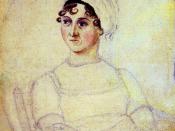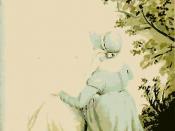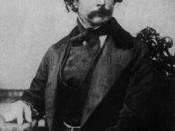The passages taken from Jane Austen's and Charles Dickens' novels show differences in marriage proposals. The type of rhetoric used by each man causes different effects .
In the first excerpt taken from Jane Austen's Pride and Prejudice, the man reasons that he must set an example for all others in his parish by taking a wife. Not only will he have made use of the advice given him by his patroness, Lady Catherine de Bourgh, but this wife shall give him happiness. "First, that I think it a right thing for every clergyman in easy circumstances (like myself) to set the example of matrimony in his parish. Secondly, that I am convinced it will add very greatly to my happiness; and thirdly... that it is the particular advice and recommendation of the very noble lady whom I have the honor of calling patroness." (lines 1-8) He believes that this act of matrimony will not only be good for him but also for the one being proposed to.
She will enjoy his superb manners, the advantages of his high power, as well as the kindness shown by Lady Catherine.
This proposal seems to be said in a businesslike tone, by one who is certain of success. He trusts that she will see the benefits of such a marriage between them and for those reasons she will accept his generous offer. Her reaction however may not be taken the way he would like. Because this is said in such a businesslike tone and not lovingly, she may deny his proposal.
The man in Charles Dickens' book wishes to marry the proposed for one reason: love. "You know what I am going to say. I love you... what I mean is that I am under the influence of some tremendous attraction..."...


